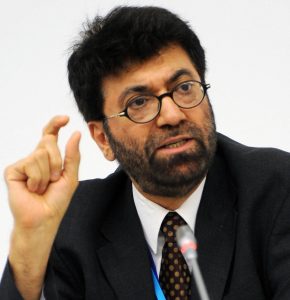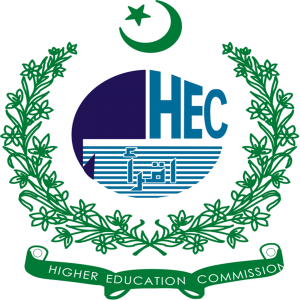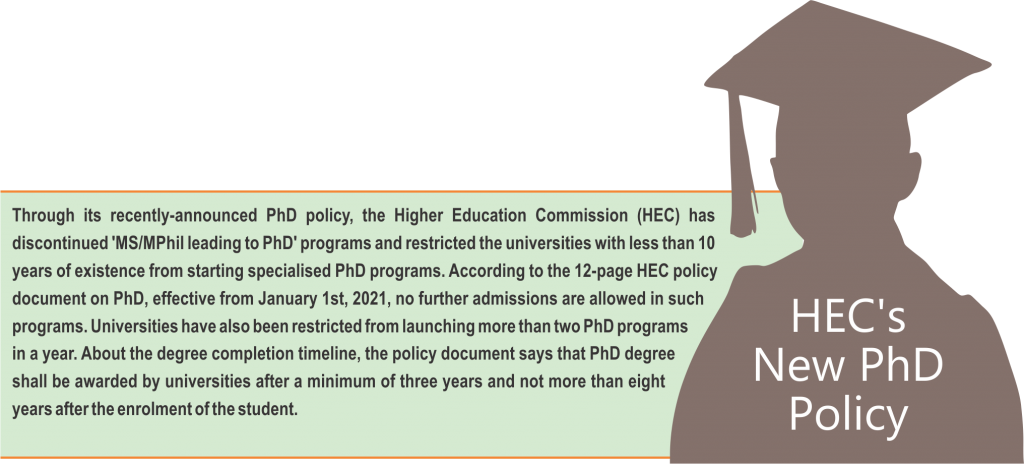HEC’s New PhD Policy
Patching the Bumpy Road to PhD
The HEC’s new policy said that in case of students who are unable to complete the program within eight years, the university may designate a competent authority to determine whether the delay was caused by circumstances beyond the student’s control, and if so, grant an extension in such exceptional circumstances. It is said that the date of notification of the award of the PhD degree after the PhD defence shall be considered the date of the completion of PhD studies. The minimum requirement to a PhD program shall be the completion of the BS (or equivalent) degree. To avoid confusion, it has been clarified that the criterion in this regard is about the minimum requirements, and universities are free to establish their own admissions framework that may vary by discipline, if it satisfies the minimum conditions outlined in this policy.
 Keeping in view that doctoral studies are intended to be rigorous and demanding, universities need to ensure that entrants to doctoral programs are capable of handling the academic rigor required to complete a PhD degree. For admission in PhD programs, a minimum CGPA of 3.0 (out of 4.0 in the semester system) or First Division (in the annual system) in the most recent degree obtained is required, whether such degree was obtained from a Pakistani or a foreign university. The policy document said that the Higher Education Institutions have to obtain a no-objection certificate (NOC) from the HEC before the launch of any PhD program. Meanwhile, the students will have to complete the minimum credit requirement to qualify for a BS degree which is 120 credits. The students have to select a major subject which is the academic discipline or specialised area of study selected by the student as his/her primary focus. Every undergraduate student has to declare a major. Ordinarily, a major is associated with a department. The exceptions are interdisciplinary majors or custom-designed majors, which are put together by the student and allowed subject to the approval of the academic advisor and any other authority that may be specified.
Keeping in view that doctoral studies are intended to be rigorous and demanding, universities need to ensure that entrants to doctoral programs are capable of handling the academic rigor required to complete a PhD degree. For admission in PhD programs, a minimum CGPA of 3.0 (out of 4.0 in the semester system) or First Division (in the annual system) in the most recent degree obtained is required, whether such degree was obtained from a Pakistani or a foreign university. The policy document said that the Higher Education Institutions have to obtain a no-objection certificate (NOC) from the HEC before the launch of any PhD program. Meanwhile, the students will have to complete the minimum credit requirement to qualify for a BS degree which is 120 credits. The students have to select a major subject which is the academic discipline or specialised area of study selected by the student as his/her primary focus. Every undergraduate student has to declare a major. Ordinarily, a major is associated with a department. The exceptions are interdisciplinary majors or custom-designed majors, which are put together by the student and allowed subject to the approval of the academic advisor and any other authority that may be specified.
HEC Chairman, Tariq Banuri, said, “HEC has abolished the condition of having an MS or MPhil degree for admission to PhD.” HEC had received a lot of critique regarding the new admission policy for PhDs. HEC has still decided to go ahead with the policy that came into effect on 1st January 2021. The new policy allows a student to directly undertake a PhD after their Bachelor’s degree. HEC has also allowed students to pursue a PhD in another discipline. It has also removed the requirement of sending PhD dissertations to foreign experts for review and the dissertations can now be sent to Pakistani experts. People have critiqued that this will lower the quality of education and research performed in Pakistan. The policy will not apply to students that are already enrolled in a PhD program. The minimum duration of a PhD degree has also been set at 3 years with the maximum at 8 years. PhD students are also required to complete the coursework over at least two years or at least 30 credit hours. In the previous policy, it was set at 18 credit hours.
 A large number of private students who attempt the traditional MA/MSc programs are in the dark about their fate as the Higher Education Commission (HEC) has yet to clarify these programs in its recent policies. Recently, the country’s higher education regulator unveiled new Undergraduate Education and PhD Degree Program policies. As per the Undergraduate Education Policy, the Associate Degree program has replaced the two-year BA/BSc degree but so far the commission has failed to clarify as to what would be the replacement of traditional MA/MSc programs. While cautioning the students, the HEC asked the students not to take admission in 2-year BA/BSc and MA/MSc programs as the same had been phased out because of ‘quality concern’. While for BA/BSc the replacement is Associate Degree but no such alternative academic program has been announced for MA/MSc which has caused concerns among thousands of individuals who attempt these qualifications as private candidates. As per the HEC policy Associate Degree could be taught mainly at affiliated colleges.
A large number of private students who attempt the traditional MA/MSc programs are in the dark about their fate as the Higher Education Commission (HEC) has yet to clarify these programs in its recent policies. Recently, the country’s higher education regulator unveiled new Undergraduate Education and PhD Degree Program policies. As per the Undergraduate Education Policy, the Associate Degree program has replaced the two-year BA/BSc degree but so far the commission has failed to clarify as to what would be the replacement of traditional MA/MSc programs. While cautioning the students, the HEC asked the students not to take admission in 2-year BA/BSc and MA/MSc programs as the same had been phased out because of ‘quality concern’. While for BA/BSc the replacement is Associate Degree but no such alternative academic program has been announced for MA/MSc which has caused concerns among thousands of individuals who attempt these qualifications as private candidates. As per the HEC policy Associate Degree could be taught mainly at affiliated colleges.
 This Associate Degree program could not be offered to students who sit in exams as private candidates. But interestingly, Punjab University and many other universities are already offering Associate Degree programs to private students. Last few years’ data shows that only from the University of Punjab around 90,000 candidates appear in MA/MSc (Part-I and Part-II) programs as private candidates each year while double of that appear in BA/BSc exams as private candidates. At the Allama Iqbal Open University (AIOU), some 5000,000 students study BA/BSc (a considerable chunk from remote areas of Balochistan, AJK, and other areas) while 150,000 students study MA/MSc program annually, and similarly these qualifications were offered by dozens of other public universities across Pakistan.
This Associate Degree program could not be offered to students who sit in exams as private candidates. But interestingly, Punjab University and many other universities are already offering Associate Degree programs to private students. Last few years’ data shows that only from the University of Punjab around 90,000 candidates appear in MA/MSc (Part-I and Part-II) programs as private candidates each year while double of that appear in BA/BSc exams as private candidates. At the Allama Iqbal Open University (AIOU), some 5000,000 students study BA/BSc (a considerable chunk from remote areas of Balochistan, AJK, and other areas) while 150,000 students study MA/MSc program annually, and similarly these qualifications were offered by dozens of other public universities across Pakistan.
Several vice-chancellors (VCs) and other high ranking officials of different universities have also pointed out that people at the HEC seemed oblivious to the likely worst effects of its policies, what they termed, ‘borrowed from abroad primarily, the United States’. In case, if HEC does not come up with an alternate route of education for private students, this will not just close the doors of higher education on poor students but would also cost a lot to the universities which are already struggling to meet their expenses, especially related to pensions of the retired employees and scholarships to needy on-campus students. Punjab Minister for Higher Education Raja Yassir Humayun Sarfraz said the capacity of the colleges was being enhanced and the same could not be achieved unless one starts. “We started BS program from 30 colleges and now more than 100 public colleges out of over 700 colleges are offering BS qualifications”. Raja Yassir said the BS programs and new Associate Degree programs being offered at public colleges were aimed at producing graduates having employability skills which was not the case in the past.
The policy has been termed as “flawed” and “directionless” by academics and policy experts. Notably, the Federation of All Pakistan Universities Academic Staff Association (FAPUASA) has categorically “rejected” the proposed policy. Currently, a two-year MS/MPhil degree is the minimum requirement for direct admissions to PhD However, according to the new proposed policy, a BS degree, or equivalent (16 years education) will be the minimum criteria for PhD admission. There is a strong perception that the new policy is unlikely to yield any positive results in the field of higher education. Academics are of the view that BS students are generally not capable of pursuing a PhD degree due to a lack of technical and professional skills. We are all set to let the world know our PhD is not only academically compromised but technically insignificant as well.
The writer is a PhD Scholar (English Literature).
He can be reached at: hbz77@yahoo.com
 Jahangir's World Times First Comprehensive Magazine for students/teachers of competitive exams and general readers as well.
Jahangir's World Times First Comprehensive Magazine for students/teachers of competitive exams and general readers as well.



